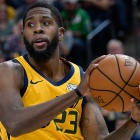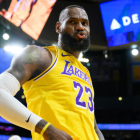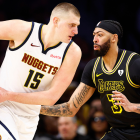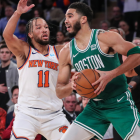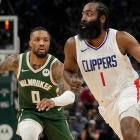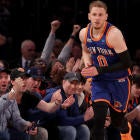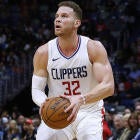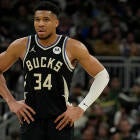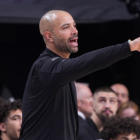SALT LAKE CITY -- Deborah Kingwood was sitting on the sidelines of the Utah Jazz practice facility the other day with a big smile on her face. As she spoke about the past several years of her son's life, you could see the tears starting to well up in the corners of her eyes. She was contemplating just how well things had worked out for her son, Royce O'Neale.
And she was amazed at the fact that all his adversity -- the ankle injury his junior year of high school that wrecked the most important summer for his college recruitment, the far-too-low recruiting rankings for a guy who expected to become an NBA player, the lack of college offers, the broken thumb his freshman year in college, the disappointing draft night, the years spent overseas -- had led him here, to one of the best places in the NBA for rehabilitating the castoffs and developing the overlooked.
The second-year Jazz swingman has established himself now as a legit NBA rotation player. The tough, versatile, 3-and-D 25-year-old has occupied an important role on the Jazz for the second season in a row. He's only averaging five points in just shy of 16 minutes per game, but that's very much beside the point. The point is that he's perfectly happy in whatever role is given to him as long as he's contributing to a winning culture. And he does. He comes in, he plays hard, he makes shots -- he's shooting 40 percent from three so far -- and he is the type of team-oriented player who fits in perfectly with the Jazz's culture. (Watch Utah take on the Indiana Pacers Monday on night at 7 p.m. ET, available on fuboTV through the NBA League Pass extension here).
But it's easy to forget that only a little more than a year ago, the idea of O'Neale ever finding a niche in the NBA seemed highly unlikely. He hadn't even been ranked nationally as a recruit coming out of high school; in fact, he was only ranked 63rd in his state (Texas). He played mid-major ball in the Sun Belt Conference (University of Denver) before transferring to Baylor. He went undrafted out of Baylor. He'd played overseas in Germany and Spain before signing a deal to play in Lithuania last season. Not that there's anything wrong with having an overseas career -- you can make good money doing that, and you can see the world -- but an overseas career is most definitely not the same thing as an NBA career. And O'Neale's dream, ever since he was a two-year-old dunking on the Fisher-Price basketball goal his mom got him, has been to play in the NBA.
"I asked him when he was a kid, 'What do you want to be when you grow up?'" Kingwood recalled as her son was finishing up practice. "He said, 'I want to play in the NBA.' I said, 'OK, if that plan doesn't work out, what do you want to be?' He stared at me and said, 'I'm going to be in the NBA.'"
"Then, leading up to the draft, a lot of agents were giving us feedback, saying, 'You're going to have a great career overseas,'" she continued. "Nobody was talking about what he could do in the NBA. And Royce said, 'If that's the route I have to take, I'll take that route -- but I'm going to play in the NBA.' People told him, 'Oh, you'll do well overseas.' I told Royce, 'Don't ever let someone tell you what you can and can't do.'"
Now is where the proud mama's tears start to come in. After O'Neale went undrafted, he played in summer league, didn't get any offers from NBA teams and signed with MHP Riesen Ludwigsburg, near Stuttgart and in Germany's top-tier league, for about $85,000. The next summer, he played in summer league, didn't get any offers, and signed with Herbalife Gran Canaria, a team in the Canary Islands in the top Spanish league. The next summer -- the summer of 2017, when O'Neale was 24 and his NBA clock was ticking -- he played in summer league. The day after summer league, Jazz head coach Quin Snyder called. Snyder offered his congratulations. O'Neale was invited to the Jazz; they were signing him to a deal. He called his mother.
"I got some good news and I got some bad news -- what do you want to hear first?" O'Neale told his mother. She smiled as she remembered the phone call: "And I said, 'Give me the bad news first.' And he said, 'The bad news is you won't get a chance to visit Lithuania.' I said, 'What?' He said, 'Mama, we made it.' I started crying."
As O'Neale's mother was reliving one of the most emotional moments of her life, Snyder walked by. He paused, dapped her up and smiled. "He's just the best," she whispered as he walked toward a media scrum.
These types of stories -- redemption stories, and stories of hard work and inspiration and unlikely successes -- have become commonplace around the Utah Jazz. There's O'Neale, who nobody thought would make the NBA -- except for him and his mother. There's Joe Ingles, the journeyman Aussie who was finally given a chance with the Los Angeles Clippers in the 2014 preseason, only to be cut at the last minute -- then was signed by the Jazz. Ingles started all but one of the Jazz's games last season, and has become one of the top three-point shooters in the NBA. There's Rudy Gobert, who wears the number 27 to remind himself of how low he went in the draft. He spent time in the G League at first; now, he's the NBA's reigning Defensive Player of the Year. There's Ricky Rubio, cast off from the Minnesota Timberwolves, and Jae Crowder, traded away by the Cleveland Cavaliers, and Georges Niang, who worked his way from a two-way contract last season to a three-year big-league deal this season.
Why so many of these underdog stories on one team?
"Just the commitment from the top down to development," Ingles told me. "In the five years I've been here it's gotten better and better every year. For us as players it's pretty easy to come over here and come to work and work your hardest. The commitment they have to player development is second to none."
And then there's the team's primary player, second-year star Donovan Mitchell -- never an elite high school recruit, a two-year college player who somehow lasted until the 13th pick in the draft -- who is now one of the brightest young stars and personalities in the NBA.
"I've always been the underdog, and that's why I relate so much to Utah," Mitchell told me. "Because we're underdogs, we're overlooked, kind of thought of as an afterthought. So when you come in and play us and we work hard, it's like, uh-oh -- that's when we hit you."
What weaves this Jazz team together isn't so much the commitment to defense as it is a shared mentality: Nothing's been given to these players. They've had to work for everything they got.
It's the mentality O'Neale displayed when he got a tooth knocked out the first day of summer league practices – and then came back on the floor for practice the next day.
"It's always just keeping that dream alive," O'Neale told me after a recent Jazz practice. "Getting chances. Realizing how close I was. Playing summer league each summer until I got the opportunity. Just not giving up really."
When he signed his first NBA contract, he wanted to buy something for his mom, who raised him and O'Neale's older sister by herself. She told him she already had everything she ever wanted, and that he should buy something nice for himself. He bought his first new car, a Mercedes.
"I get emotional to this day when I talk about that phone call," she said. "I've gotten better at holding back the tears. But that day, I was paradise proud of Royce. I knew what he'd been through. I told him, 'You've been given the chance of a lifetime -- make the most of it.'"













